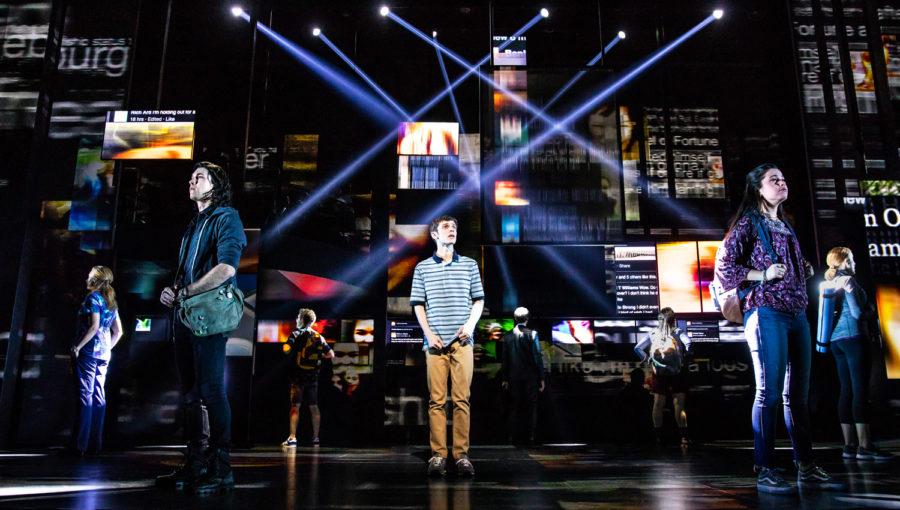‘Dear Evan Hansen’ brings Pittsburgh audiences to tears
Courtesy of Pittsburgh Cultural Trust
Ben Levi Ross (center) in “Dear Evan Hansen.”
May 22, 2019
Recent popular media has taken a closer look at mental health and mental illness. The 2017 Netflix original series “13 Reasons Why” focuses on the reasons a high school teenager took her own life, while “BoJack Horseman,” another Netflix original show, centers on a celebrity horse that copes with addiction and depression.
“Dear Evan Hansen” matches the trend. The musical, which opened on Broadway in December 2016, focuses on teenager Evan Hansen, a complete outsider at his high school, and his experience fitting in with a family that just lost a son and brother, Connor Murphy, to suicide. Evan pretends he was friends with Connor, gaining popularity at his school and within Connor’s family, providing him with a familial relationship he lacks in his own home.
Oh, and Evan is in love with Zoe Murphy, Connor’s sister. No awkwardness there at all.
The musical received critical acclaim when it was released on Broadway. Susanna Schrobsdorff, a columnist at TIME, called the show “cathartic and real and often so funny it’s hard to believe the catalytic event is the suicide of a kid we barely meet.” The musical won six Tony awards in 2017, including Best Musical, and a 2018 Grammy for Best Musical Theater Album.
The show deals with heavy themes — mental health, communication difficulty in parent-child relationships and social media, to name a few — in a shockingly blunt manner. And it’s effective, judging by the sniffles heard in the audience after the finale Tuesday night.
The show, which is now touring 60 different cities across the United States and Canada and is currently playing at Pittsburgh’s Heinz Hall, lives up to the hype of the original Broadway showing. Thematically, the musical does an excellent job handling intricate, emotional subjects. While mental health is certainly a major focus, as the entire plot focuses on the suicide of a major character, other issues including the strained relationship between Evan and his mother, Heidi, are tackled in a mature, real way.
Based solely on artistic display, the first act of the show completely excels. Basic elements such as set display were, of course, important. The set was primarily composed of thin screens hanging from the ceiling with projections of Twitter feeds, social media notifications and, right before the beginnings of the acts, reminders to silence cell phones. This design was used for most of the musical as a simple backdrop, a constant reminder of the technology and social media themes, but also served as an indication that two people were talking over some instant messaging app.
But where the artistic talent of the directors, actors and stage managers came through most was in the show’s singing and choreography. Actor and Carnegie Mellon School of Drama graduate Ben Levi Ross, who plays Evan, gave the audience goosebumps with his passionate singing. Ross’ control over his volume and vibrato allows him to sing the soft, gentle lyrics of the love songs like “If I Could Tell Her,” as well as the belting choruses of “Waving Through a Window” and “You Will Be Found,” the two most popular pieces of the musical.
Actress Maggie McKenna, who plays the part of Zoe, sings with similar talent. Her soft yet lofty voice allows her to match Evan during their harmony in “If I Could Tell Her” and to stand on her own as an independent singer during “Requiem” as she lambastes her brother for, frankly, being a bad person and a worse brother.
The choreography was astounding as well. Though used sparingly, it contributed significantly to the development of the plot and Evan’s character. The biggest contrast in choreography can be seen between “Waving Through a Window” and “You Will Be Found.” In the former, everyone ignores Evan on his first day of high school, intentionally facing away from him as he tries to grab their attention, while in the second, everyone is in the exact same position on stage yet facing directly towards him, indicating that he has become the center of attention.
Where the first act excelled in artistic ability, the second act matched in acting and plot development. This was where the heavy-hitting subjects came to the foreground and where the supporting characters’ acting abilities shone.
Heidi Hansen is portrayed by Jessica Phillips. She was the star of the second act and did a fantastic job playing the imperfect, struggling mother who is just trying to relate to her kid. Her secondhand pain was visible as she recognized the emotional issues Evan was hiding from her, and many people in the audience cried with her in empathy.
And Evan shows character development as well, actually cracking jokes confidently by the end of the musical, in large contrast to his shy, anxious self at the beginning of the first act. He tells Zoe he can get her a Pottery Barn friends and family discount — but only for the next three weeks, before he quits.
“Your window is closing fast,” Evan said to laughter from the audience.
“Dear Evan Hansen” is a must-see for any frequent musical-goer. The artistic vision of the musical writers pairs well with the meaningful plot and excellent acting, and it creates a musical that anyone is bound to enjoy.
“Dear Evan Hansen” has evening showings from Wednesday through Sunday and matinees on Saturday and Sunday at Heinz Hall. Less than 1% of seats remain available at all showings.



